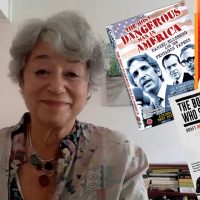Judith Ehrlich: Filmmaker

JUDITH EHRLICH is an Oscar-nominated documentary filmmaker. She co-produced and co-directed The Most Dangerous Man in America: Daniel Ellsberg and the Pentagon Papers, which was nominated for an Academy Award and Primetime Emmy in 2009. The film won the George Foster Peabody Award, screened at thirteen international festivals, opened in over 100 theaters in the US and was broadcast on eighteen public television networks internationally. Ehrlich also co-produced and directed The Good War and Those Who Refused to Fight It another ITVS documentary, which tells the story of the men who, guided by principle, took the unpopular position of pacifism during World War II. She is the only filmmaker to twice win the top US awards for history film: The John O’Connor Film History Award, from the American Historical Association, and the Eric Barnouw Award, from the Organization of American Historians.
The Boys Who Said NO! is the third film in Ehrlich’s war resistance trilogy, and features contemporary video interviews with David Harris, Joan Baez, and other major resistance figures of the Vietnam-USA War.
The videos below were recorded via Zoom, are organized by Success Factor and run between 30 seconds and 5 minutes. Click on any video. You must be connected to the Internet to view the videos.
INSIGHT & INSPIRATION: 1:41 min.
CREATES A UNIQUE PERSONAL BRAND: 1:41 min.
SEIZES OPPORTUNITIES: 1:20 min.
INSIGHT & INSPIRATION: 1:58 min.
COLLABORATION: 1:23 min.
OVERCOMES CHALLENGES TO SUCCEED: 0:55 sec.
UNDERSTANDS THE AUDIENCE’S PERSPECTIVE: 2:05 min.
INSIGHT & INSPIRATION: 2:13 min.
SEIZES OPPORTUNITIES: 2:33 min.
CRITICAL THINKING: 5:29 min.

